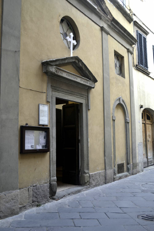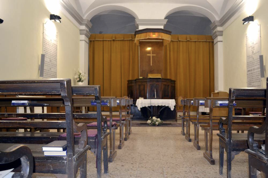MEMENTO - THE WALDENSIANS
- hugo2825
- 6 giu 2020
- Tempo di lettura: 3 min
Protestants avant la lettre

Origins
The roots of this religious community date back to France towards the end of the twelfth century. In 1170 Peter Waldo, a wealthy merchant in Lyon, decided to relinquish all his riches, to leave them to the poor, to live a life of poverty, and to devote himself to preaching the word of God. Convinced that any Christian irrelevant of his education should be able to understand the message of the bible, he translated some of its books into his local French vernacular. Further principals of his were the rejection of transubstantiation, purgatory, the worship of relics and saints, and the selling of indulgences as practiced by the catholic church. Moreover, within the Waldensian concept of faith any believer is called on to spread the Christian message as a lay preacher.
Forerunners
Waldos followers soon became known as simply „The poor“, wandering through the streets of Lyon and helping the needy. Even though they did not consciously challenge catholicism, and in fact would consider themselves catholics right up to the reformation, their idiosyncratic tenets soon proved incompatible with the teachings of Rome. Given their basic axioms of christian life as stated above, particularly their rejection of indulgences and relics, the Waldensians appear as palpable forerunners to the protestant reformation roughly three centuries later, anticipating Martin Luther’s major postulations, rejections, and innovations.
Persecution
Not surprisingly Waldo and his disciples were soon to be expelled from the town of Lyon, and thereafter to be excommunicated by pope Lucius III in the year 1184. Thus they took shelter in the Val Chisone, Valle Germanasca, and Val Pellice in the Cottian Alps in the western part of Piedmont separating Italy from France. Yet even then, they remained subject to severe persecution and massacres, for instance in Luberon in 1545 or in the so-called Piedmont Easter in 1655. The utter brutality of the latter is reflected in John Milton’s poem „On the Late Massacre in Piemont“. In 1848 the Waldensians were finally granted their legal rights and religious freedom in the then Kingdom of Piedmont and Sardinia, whereupon they spread their message all over the peninsola. During the Second Word War the Waldensians joined the Resistance, and seemingly remembering the oppression which they had suffered themselves over centuries, granted refuge to many Jews in dire need of protection.
Waldensians worldwide
In the course of those long centuries of persecution many Waldensians continued their flight from the Piemontese valleys to other parts of Europe, to adjacent Switzerland, to Germany, Austria, or even Bohemia, founding new communities there. As such they are no longer in existence instead having joined protestant believers of some kind. Other Waldensians found shelter in the north and south of America where many of those newly-founded communities have survived and have lived an active religious life up to the present day.
However, it is Italy that has remained the stronghold of this persecution stricken religious community. Out of the supposed total of 50’000 Waldensians worldwide, 30’000 live in Italy, with another roughly 20’00 scattered predominantly over Argentina, Uruguay, and the United States. A great many of the Italian Waldensians still live in the valleys near Turin where their ancestors once sought refuge centuries ago. However, today’s Chiesa Evangelica Valdese shows its presence all over the country, and in fact their charity actions are widely known, and they are held in high esteem. As Christian believers the Waldensians have remained unpretentious to the point of being humble. As the pictures below show, their churches will be without decoration, and a modest table will serve as an altar.
A Waldensian church: Chiesa Valdese in Via Galli Tassi 50, Lucca, Toscana
The initial picture shows the Waldensian symbol, with the latin inscription meaning „A light is shining in the dark“.
https://www.chiesavaldese.org (official website)
References
Audisio, Gabriel, The Waldensian Dissent: Persecution and Survival, c.1170–c.1570, Cambridge Medieval Textbooks. Cambridge: Cambridge University Press, 1999.
Entry in Encyclopedia Britannica
H.M.S - Merlin 07/06/2020





Commenti